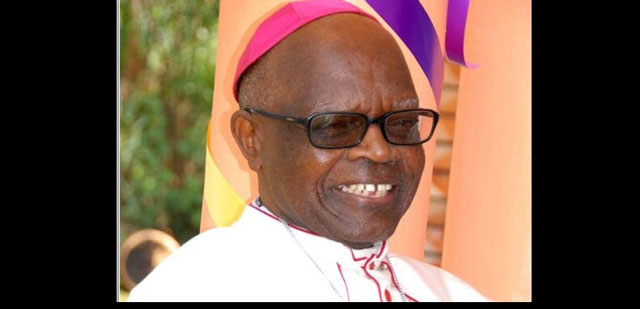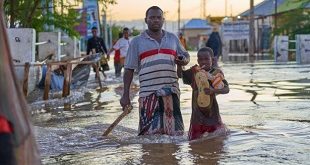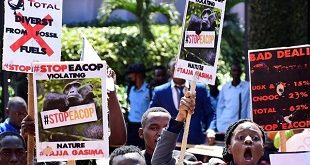
Baharagate Bows Out after 53 Years of Episcopal Journey
Hoima, Uganda | THE INDEPENDENT | The Catholic community in Uganda is mourning the death of Dr. Albert Edward Baharagate Akiiki, an eminent figure who served as Bishop of Hoima Diocese from 1969 to 1991.
The bishop, who was 93 years old, passed away at Nsambya Hospital where he had been receiving treatment for the last two weeks for various conditions related to his old age.
Baharagate was among a group of 12 priests who were consecrated as bishops during the first Papal Visit to Uganda and Africa on August 1, 1969. During an open-air Mass at Kololo Grounds, in Kampala, Pope Paul VI consecrated the 12 bishops including four Ugandans. Those from Uganda included Baharagate, John Baptist Kakubi of Mbarara Diocese, Serapio Bwemi Magambo Abwoli from Fort Portal Diocese, and Barnabas Halem’Imana who became Bishop of Kabale Diocese.
In fact, this was one of Baharagate’s fondest memories, even in his old age this remained vivid. The bishop remembered this day and shared his thoughts during his last media interview with URN which took place at his modest residence at St. Jude Parish in Masindi Municipality, just a short distance from the Presidential Lodge. In his own words, “I can’t forget that day, I wish I can relive it.”
Individuals who knew or lived with the bishop, in his better days he took pleasure in sharing anecdotes from his youth, including his experiences as a student in Rome, his astonishment at being chosen as a bishop, and the occurrences surrounding his consecration by Pope Paul VI.
With God granting him the gift of a long life, Baharagate has been the only surviving Founding Father of the Symposium of Episcopal Conferences of Africa and Madagascar (SECAM). SECAM was established in July 1969 as a forum bringing together Catholic bishops from Africa to chat about ways of preserving, fostering, and promoting communion, joint action, and collaboration.
At the time of his passing, Bishop Baharagate held the record of being the second longest-living bishop in Uganda. He celebrated his 53rd episcopal ordination anniversary in August 2022, a feat only surpassed by Archbishop James Odongo who lived as a bishop for 55 years and eight months. Archbishop Odongo was appointed a bishop in November 1964 and passed away in December 2020, aged 89.
With the passing on of Baharagate, only Emmanuel Milingo still lives, of the 12 bishops who were consecrated during the inaugural Papal Visit to Uganda. Milingo, now aged 92, served as Archbishop of Lusaka from 1969 to 1983 when he resigned.
In 2006 he was excommunicated following his decision to marry in contravention of church Canons. In 2009 Milingo was defrocked and reduced to lay status, meaning that while he remains the only man standing of the 12, he is neither a cleric nor a member of the Catholic Church.
Baharagate was born on February 25, 1930 at Nyamigisa village, in Masindi District, to Isdore Kwebiiha Abwoli and Febronia Kabanaku Abwoli. After his early education at Sacred Heart of Jesus Primary School in Nyamigisa, which was later renamed Saint Dominic Savio Primary School, Baharagate joined St. Francis Xavier Kitabi Seminary in Ankole.
At Kitabi, he met other students including Magambo from Kyaka, Tooro; Halem‘Imana from Rurangara, Ankole; and Kakubi from Birundama in Ankole. Their paths would cross again later in their priestly journeys, including that joint episcopal ordination in 1969.
Remarkable work in Hoima
As Hoima was breaking away from Fort Portal Diocese, Baharagate, then a young priest, was due to travel to Rome, Italy to commence his doctoral studies. He had been ordained into priesthood seven years earlier, in December 1958, and was, among other duties, a Mathematics teacher at St. Leo’s College, Kyegobe.
After completing his studies in Rome, Father Baharagate returned to Uganda and was appointed as the Bishop of Hoima Diocese, which was just two years old at the time. The diocese had been carved out of Fort Portal Diocese in 1965 with Cypriano Kihangire as its first Bishop.
On the day of consecration, Pope Paul VI forewarned him, and his colleagues, that his new task set upon his shoulders the weight of numberless duties, responsibilities, and of sorrows. The Pope tasked the newly ordained bishops to accept to work in poverty, and often against the opposition, but to open their hearts to the children, to youth, to the poor, and to all who suffer.
During the interview last year, Bishop Baharagate noted that the words of the Pope struck him deeply as a young Bishop who had been tasked to lay a strong foundation for the young diocese that was struggling with financial resources and lacked the manpower to effectively run it. At the time, records show that the diocese had only 7 parishes with 15 permanent priests and a few religious men and women.
“It was a fresh garden that needed to be ploughed before any harvest,” he described the diocese. Despite skepticism from others, Baharagate who likened himself to a farmer donned his “overalls” and went to work on what appeared to be a daunting task. Baharagate, along with a small group of priests, actively encouraged lay involvement in a wide range of activities within the diocese. This approach ultimately facilitated the development of the diocese and the spread of evangelization.
Under his leadership, the Lay Apostolic Commission was established and he also played a significant role in promoting various groups and movements such as Catholic Action, Uganda Kolping Society, and the Catholic Charismatic Renewal. However, the implementation of these changes was not without its challenges. In the initial year, the young bishop faced resistance from some priests and laity who questioned his every action and decision.
Despite this, he persevered and asserted his authority over the priests to ensure their compliance with his vision for the diocese. When speaking to a URN reporter, Baharagate expressed pride in the fact that during his tenure as a leader, he did not encounter disobedience from the clergy. He attributed this to his constant guidance and advice to the priests on various issues, with the aim of keeping them on the right path and preventing any temptation.
For example, Baharagate drew on his personal experience of his parents forbidding him from drinking beer and applied this lesson to advise the priests in his diocese to abstain from alcohol. By imparting this advice, he sought to reduce the risk of the priests falling into temptation, thereby ensuring their adherence to their religious duties. Under Baharagate’s leadership, an unwritten norm was established that stipulated that no priest was to travel at night, with the aim of upholding the image of the priesthood.
Despite being understaffed, he recognized the importance of training and development for his priests and thus ensured that they received additional training according to the needs of the diocese. This was achieved by sending many of them to European universities for further studies, with Rome being a popular destination.
Furthermore, Baharagate introduced a development arm of the diocese which undertook various activities that enabled the diocese to become self-sustaining and support the cardinal role of evangelization. Through this initiative, the diocese was able to achieve greater autonomy and reduce its reliance on external support.
Early Retirement
In 1991, despite having 14 more years before reaching the mandatory retirement age, Baharagate stepped down from his position as Bishop of Hoima after 22 years at the helm. In the interview, he stated that he had fulfilled his duties and wished for someone else to continue his work. He retired at the age of 61, which is well below Canon Law’s retirement age of 75 for Catholic bishops.
However, it is possible that his decision to retire was influenced by his declining health, as he was battling hypertension and diabetes which had weakened him. Following his request to retire, the Pope appointed Deogratias Muganwa Byabazaire as the Coadjutor Bishop of Hoima in 1990. Byabazaire eventually assumed the role of Bishop of Hoima in March 1991 and served until his passing in February 2014.
In November 2015, Pope Francis appointed Vincent Kirabo Amooti, then a lecturer at Ggaba National Seminary, as the Bishop of Hoima Diocese. When Baharagate announced his retirement, the diocese attempted to prepare a retirement home for him in Masindi, as it is customary for retired bishops to receive contributions towards their living expenses from their respective dioceses. However, due to financial constraints, the plan did not materialize.
Baharagate later decided to retire outside of his diocese for various reasons, including ensuring that his successor could establish his own leadership style. He resided at Our Lady of Fatima, Nakulabye Parish, for over three decades, making pastoral visits to various Hoima parishes with permission from the reigning bishop.
In 2020, he accepted an invitation to return home and spent a year at St. Cyprian Parish in Hoima before finally relocating to his home parish in Masindi. Sadly, a few days after relocating, the bishop suffered an accident as he was leaving the bathroom, resulting in a fractured thigh bone that left him immobile.
Baharagate lived a simple life, and his only luxury was a television set in his two-roomed quarters, located just a few meters away from the parish priest’s office. In his final days, he spent most of his day praying. “I couldn’t greet you in a better way. Lately, I have been making a few movements from this bed. But I am still strong, and this situation is just temporary,” the smiling bishop told our reporter dismissing his frailty as only temporary.
When he wasn’t praying, he was busy with mathematics, a subject he loved and taught as a young priest. Church music and sports, especially football and tennis, were two other things that he was passionate about. He boasted about being the best football player, saying, “You can ask around,” with a broad smile on his face. No wonder even the news of his appointment as Bishop of Hoima broke to the public while he played football with his colleagues back in early July 1969.
Looking back on his glory days on the court and pitch, the bishop hoped to inspire the next generation by building a lawn tennis court in the parish, saying, “Sports teach young people discipline. That is crucial. I used to play lawn tennis well, and if my health improves, I’ll see to it that a court is built here.” Unfortunately, he was not able to make this happen due to his health issues.
Final Advice to Faithful
In his final media interview, the bishop emphasized the importance of cooperation between priests and the faithful to prevent any possible misunderstandings and conflicts. He urged them to remain prayerful and to work together harmoniously.
******
URN
 The Independent Uganda: You get the Truth we Pay the Price
The Independent Uganda: You get the Truth we Pay the Price


